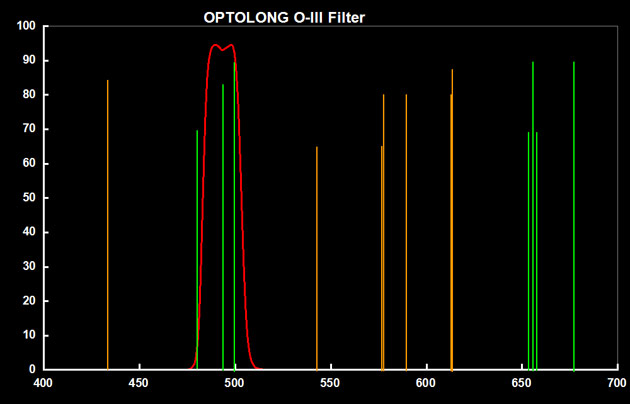Optolong narrowband OIII filter is designed for nebula observation allowing 18nm bandwidth of light centered on a wavelength of 500nm.
Optolong narrowband OIII filter is designed for nebula observation allowing 18nm bandwidth of light centered on a wavelength of 500nm through, which corresponds to OIII emission lines, and reducing the transmission of certain wavelengths of light, specifically those produced by artificial light including mercury vapor, and both high and low pressure sodium vapor lights and the unwanted natural light caused by neutral oxygen emission in our atmosphere (i.e. skyglow).
Optolong OIII Introduction
Optolong narrowband OIII filter is designed for nebula observation allowing 18nm bandwidth of light centered on a wavelength of 500nm through, which corresponds to OIII emission lines, and reducing the transmission of certain wavelengths of light, specifically those produced by artificial light including mercury vapor, and both high and low pressure sodium vapor lights and the unwanted natural light caused by neutral oxygen emission in our atmosphere (i.e. skyglow).
OIII emits 495.9nm and 500.7nm and it is a blue-green colored filter. Many of images of planetary nebula and supernova remnants are taken only with H-alpha and OIII filters. They show great structural details, but have natural colors, looking like an RGB image.
Main Use
Suitable for visual observation on most emission nebulae, planetary nebulae and supernova remnants.
Suitable for viewing on bright nebulae like M42 Orion Nebula in heavy light pollution.
Use with a large aperture telescope under clear and dark viewing conditions with good seeing.
Narrowband filter do not eliminate the effects of light pollution or increase the object’s brightness. In many cases, they increase the contrast between nebula and night sky, not brightening the nebula.
WARNING: The filters of Optolong are not designed for sun observation. DO NOT LOOK AT THE SUN WITH OPTOLONG FILTER. You would be BLIND if you fail to observe the warning.
Optolong OIII Spectrum and Characteristic
Sbustrate: Optical glass
Thickness: 1.85mm
Tave: T>80%
Blocking range: 400-700nm
Blcoking depth: light pollution line blocking >99%
Surface quality: 60/40
Transmitted Wavefront RMS: λ/4
Parallelism: 30s
How to read the chart?
▲The horizontal axis is the Wavelength in Nanometers(nm).
▲The vertical axis is transmission in %.
▲The RED line shows the transmission of the OIII filter. Green line shows the emmission of nebula. The artifical emission lines are shown in ORANGE.
Coating Technology
·Multi-layers anti-reflection coating
·Non-cementing optical substrate coating
·Optolong filter adopts precision coating based on Ion-assisted deposition coating technology for durability and resistance to scratching, as well as stability on CWL(central wavelength) no deviation affected by temperature change.
·Planetary rotation system offers precision and homogeneity of coatings ensuring high value on transmission of pass-band and Optical density of off-band.
Packing
Outer Box: silve box
Plastic Box: PP material
Lining: imported high pressure white EVA material

Optolong OIII feature:
2" dia
Home
Contact Us
Happy Customers
Our History
Terms and Conditions
Privacy Policy
Refund Policy
Shipping Policy
Pay
STARTRACKER [ India ]
EXPLORE SCIENTIFIC [ USA ]
G.S.O. [ Taiwan ]
Goto Mounts / Tripods [ U.S.A ]
BRESSER [ Germany ]
William Optics [ Taiwan ]
DWARF LAB [ China ]